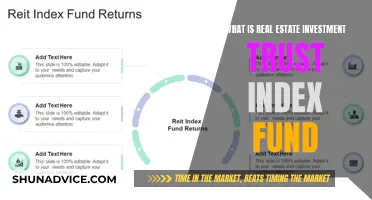
Investing in equity funds is a great way to diversify your portfolio and strengthen your asset allocation. Equity funds are a type of investment fund that pools money from investors to buy a portfolio of stocks, with fund managers aiming to generate returns. They offer a professionally managed and diversified approach to investing in stocks, providing the potential for attractive long-term returns.
There are two primary types of equity funds: actively managed funds and passive funds. Actively managed funds involve portfolio managers actively researching, analysing, and selecting stocks with the goal of outperforming a benchmark index, such as the S&P 500. On the other hand, passive funds, including index funds, aim to replicate the performance of a specific market index.
Equity funds provide several benefits, including diversification, professional management, and the potential for superior returns. However, it's important to consider the risks associated with equity funds, such as market risk, credit risk, and liquidity risk.
Before investing in equity funds, it's crucial to determine your investment goals, risk tolerance, and time horizon. Additionally, conducting thorough research and analysing potential funds is essential for making informed investment decisions.
| Characteristics | Values |
|---|---|
| Definition | A type of investment fund that pools money from investors to trade primarily a portfolio of stocks. |
| Type of Investment | Actively managed funds, passively managed funds, growth funds, value funds, blend equity funds, sector and geographically focused funds |
| Benefits | Diversification, professional management, superior returns, inflation-beating returns, capital appreciation |
| Risks | Market risk, credit risk, foreign currency risk, liquidity risk, political risk, economic concentration risk, inflation risk |
| Taxation | Short-term capital gains taxed at ordinary income tax rate, long-term capital gains taxed at lower rate, qualified dividends taxed at long-term capital gains rate, non-qualified dividends taxed at ordinary income tax rate |
| Considerations | Investment objectives, risk tolerance, time horizon, fund strategy, fund performance, fees |
What You'll Learn

Actively vs passively managed equity funds
Investing in equity funds offers several benefits, including diversification, professional management, and the potential for superior returns. However, it is essential to understand the differences between actively and passively managed equity funds to make an informed decision.
Actively managed equity funds have portfolio managers who actively research, analyze, and select stocks with the goal of outperforming a benchmark index, such as the S&P 500. They use their expertise and various strategies to decide whether to buy, hold, or sell stocks within the fund's portfolio. The success of an actively managed fund largely depends on the fund manager's skill and decision-making ability. These funds typically charge higher fees due to their more hands-on approach. Actively managed funds are suitable for investors who seek a more active role in their investments and are willing to take on higher risks for potentially higher returns.
On the other hand, passively managed equity funds aim to replicate the performance of a specific market index. For example, a passively managed fund tracking the S&P 500 will hold the same stocks in the same proportions as the index itself. Passive fund managers do not attempt to outperform the market; instead, they focus on tracking the index as closely as possible. Since passive funds require less active management, they generally have lower fees and taxes than actively managed funds. These funds are suitable for investors who prefer lower costs and market-tracking returns.
The choice between active and passive equity funds depends on your investment goals, risk tolerance, and investment philosophy. Some investors prefer the potential for outperformance offered by actively managed funds, while others favour the lower costs and market-tracking nature of passive funds. It is important to consider your own financial situation, risk appetite, and investment objectives before deciding which type of equity fund to invest in.
Smart Mutual Fund Investment Strategies for 5 Lakh Rupees
You may want to see also

Equity funds vs individual stocks
Investing in equity funds means buying shares of a portfolio overseen by a professional portfolio manager, who is responsible for picking the stocks in the portfolio as well as the buy, sell, and hold decisions. On the other hand, investing in individual stocks means that you are responsible for building your own portfolio, looking over annual reports and filings, making buying and selling decisions, and keeping up to date with what is happening at each company in which you hold an investment.
Equity Funds
Equity funds are a good option if you want to watch an investment's performance but would rather leave the research and analysis to professionals. They are also a good choice if you want to build your entire investment portfolio history on a single, short spreadsheet. Equity funds can be actively or passively managed. Actively managed funds have portfolio managers who use their own discretion to research, analyze and select stocks with the goal of outperforming a benchmark index. Passively managed funds follow a market index and typically have lower fees than actively managed funds.
Individual Stocks
If you are investment-savvy or prefer to build your own portfolio, selecting individual stocks allows you to retain more control over investment decisions. You will need to be able to read GAAP financial statements, including income statements and balance sheets, to select your own stocks effectively. Individual stocks are also a good choice if you enjoy learning about a company's business, industry, products, cost inputs, strategy, and how it fits into the world.
Both equity funds and individual stocks carry risk. However, individual stocks carry more unsystematic risk, which is the risk that can be diversified against. For example, by owning just one stock, you are exposed to company-specific risk that may not apply to other companies in the same sector of the market. Equity funds, on the other hand, provide diversification by investing in a wide range of stocks across different sectors and industries. This reduces the impact of any single stock's poor performance on the overall portfolio.
In terms of costs, mutual funds have fees, which can be very low if the fund is passively managed and considerably higher if it is actively managed. With individual stocks, you will generally pay a commission to buy or sell.
Invest in Your Health: Old National Bank HSA Guide
You may want to see also

Mutual funds vs stocks
Investing in equity funds can be done through two methods: direct investment through stocks or investment via mutual funds. Both have their own advantages and disadvantages, and investors can choose either or both depending on their financial goals, risk tolerance, and preferences.
Mutual Funds vs. Stocks
Mutual funds pool money from multiple investors to purchase a diversified portfolio of securities, such as stocks, bonds, or short-term securities. Each mutual fund has a specific investment objective, such as focusing on a particular industry or region, and a fund manager who is responsible for generating income and protecting the portfolio's value. Mutual funds can be actively managed, with a portfolio manager who constantly updates holdings, or passively managed, with a portfolio built on a buy-and-hold strategy.
Stocks represent shares of ownership in a specific company, and their value fluctuates based on the company's performance and market conditions. When a company does well, its stock price usually increases, benefiting investors.
Advantages of Mutual Funds
Mutual funds offer instant diversification, reducing the risk of potential losses. They are also more convenient, as they allow investors to defer decision-making to an expert. Additionally, mutual funds can be less costly, as the cost of trading is spread across all investors.
Disadvantages of Mutual Funds
Mutual funds may have sales "loads," or fees charged when buying or selling shares. They may also have high expense ratios, impacting returns. Actively managed funds, in particular, tend to have higher fees. Furthermore, mutual funds may underperform the market, and investors have less control over their investments.
Advantages of Stocks
Stocks offer the potential for large gains and generally have low trading costs, with many brokerages offering free trading. They are also easy to trade through online brokers and dedicated apps.
Disadvantages of Stocks
Stocks come with the potential for large losses if the stock price drops. Researching and choosing the right stocks can be time-consuming, and investing in stocks can be stressful due to volatility.
Mutual funds and stocks each have their own benefits and drawbacks. Mutual funds provide diversification, convenience, and lower costs but may have higher fees and less control. Stocks offer the potential for higher returns and more control but come with higher risk and volatility. The choice between the two depends on the investor's goals, risk tolerance, and preferences.
Invest Like a Billionaire: Accessing Bill Ackman's Strategies
You may want to see also

Benefits of equity funds
Equity funds are a type of investment fund that pools money from investors to buy a portfolio of stocks. They offer a range of benefits to investors, including:
Diversification
Equity funds provide investors with a diversified portfolio of stocks across different sectors and industries. This diversification helps to reduce the risk associated with investing in individual stocks. By investing in a variety of companies, equity funds can mitigate the impact of any single stock's poor performance on the overall portfolio. This makes equity funds a less risky option than investing directly in individual stocks.
Professional Management
Equity funds are managed by professional fund managers who have experience and expertise in investing in stock markets. These fund managers research and analyse various factors, such as company profitability, economic conditions, and sector performance, to make informed investment decisions. Their goal is to generate superior returns for investors by outperforming market benchmarks.
Superior Returns
Historically, stocks have offered investors the potential for higher returns compared to other asset classes like bonds and cash. Equity funds aim to provide attractive long-term returns by investing in a diversified portfolio of stocks. While there may be short-term fluctuations and periods of volatility, equity funds have the potential for strong growth over time.
Tax Efficiency
Equity mutual funds are considered one of the most tax-efficient investment options. In many cases, taxation only arises upon redemption or dividend payout, and there is no taxation during the investment period. Additionally, certain types of equity funds, such as Equity Linked Savings Schemes (ELSS), offer tax benefits under specific sections of the Income Tax Act.
Liquidity
Open-ended mutual fund schemes, excluding Equity Linked Savings Schemes, offer high liquidity. Investors can redeem their units partially or fully at any time by sending a redemption request to the Asset Management Company (AMC). However, redemptions during the exit load period may attract charges.
Mutual Funds: Long-Term Investment Safety and Security
You may want to see also

Risks of equity funds
Equity funds are a type of investment fund that pools money from investors to primarily trade a portfolio of stocks, also known as equity securities. While equity funds offer several benefits, they also come with certain risks. Here are some of the key risks associated with investing in equity funds:
Market Risk
Economic downturns, geopolitical events, or changes in investor sentiment can cause stock prices to decline. During market turbulence, equity fund prices can fluctuate significantly, potentially leading to short-term losses for investors. Maintaining a long-term investment perspective and ensuring that your investments align with your risk tolerance can help manage this risk.
Volatility and Loss
Equity funds are subject to the volatility of the stock market, which can result in higher risks and potential losses. The prices of stocks depend on various internal and external factors, and price swings can be extreme. Adopting a long-term perspective, discipline, and patience can help mitigate the impact of short-term market changes.
Management Fees and Loads
Actively managed equity funds involve higher management fees compared to passive funds. These fees can eat into your investment returns over time. It is important to consider the fund's management fees and loads (commissions) when selecting an equity fund.
Interest Rate Risk
Rising interest rates can cause equity funds to decline in value, especially if they invest in bonds or bond mutual funds. When interest rates increase, bond prices tend to decrease, impacting the overall performance of the equity fund.
Default Risk
Equity funds may be exposed to the risk of the issuer of a bond or other security defaulting on their interest payments or failing to redeem the bonds for face value. Securities with a higher risk of default tend to offer higher returns, but this also increases the potential for losses.
Inflation Risk
While equity funds can help protect against inflation risk, they may not completely eliminate it. In periods of high inflation, the returns on equity funds may not keep up with the rising cost of living, resulting in a loss of purchasing power for investors.
Angel Broking: Your Mutual Fund Investment Guide
You may want to see also
Frequently asked questions
An equity fund is a type of investment fund that pools money from investors to buy a portfolio of stocks. Fund managers aim to generate returns for the fund's investors. Equity funds are also known as stock funds due to their focus on stocks.
Equity funds offer investors several benefits, including:
- Diversification: Equity funds invest in a wide range of stocks across different sectors and industries, reducing the risk associated with investing in individual stocks.
- Professional management: Fund managers conduct research and make informed decisions about buying, holding, or selling stocks within the fund's portfolio.
- Potential for superior returns: Historically, stocks have offered higher returns than other asset classes, providing attractive long-term returns for investors.
Investing in equity funds carries the following risks:
- Market risk: Economic downturns, geopolitical events, or changes in investor sentiment can cause stock prices to decline, leading to potential short-term losses.
- Volatility: Equity funds are subject to stock market volatility, which can impact their performance.
- Management fees: Actively managed funds typically charge higher fees than passive funds due to their more hands-on approach.







